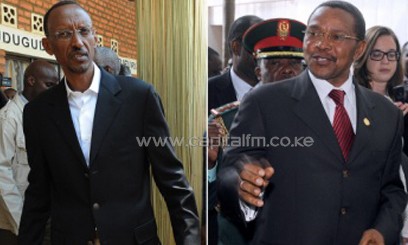The FDLR originated among Hutu extremists who murdered some 800,000 Rwandan Tutsis and moderate Hutus in three months before being routed by Kagame’s mainly Tutsi army and fleeing across the border.
Kagame maintained a stony silence when peace talks were suggested. His Foreign Minister Louise Mushikiwabo said the very idea was an “aberration”.
The two presidents then engaged in a vitriolic war of words.
On June 30, Kagame repeated that he would not respond to those who advised him to negotiate with the FDLR, but also warned that in the right place and when the right time came “I will hit them” for “there are lines one cannot cross”.
A few days later, still without naming Tanzania or Kikwete, he said he was ready “for war”.
Kikwete, for his part, without naming Kagame or Rwanda, warned that anyone who attacked his country would face “dire consequences”.
He went on to recall the fate of Ugandan former dictator Idi Amin Dada, who was overthrown when Tanzania’s leader Julius Nyerere launched a counteroffensive after a Ugandan army incursion into Tanzania.
But since then, Kikwete has said he never intended to threaten Kagame, saying he wanted “good relations with Rwanda”. He admitted the two countries were “going through a difficult patch”.
While both leaders appear to have eased off in their war of words, there is still potential for proxy warfare to escalate in the Congo.
Analyst Guichaoua said Rwanda could potentially help the M23 rebels to move into Goma, the hub of rich mining territory and a city of one million, and “neutralise the UN brigade”, which is led by a Tanzanian general.
Thierry Vircoulon of the International Crisis Group acknowledges a “rather surprising war of words” but doesn’t see the situation spiralling out of control into armed conflict “unless a Tanzanian soldier gets killed tomorrow”.
While Tanzania would rather focus on building its economy than regional conflict, it too has added fuel to the fire by expelling thousands of refugees from Rwanda, Burundi and DR Congo.
The deportations were condemned by the East Africa Law Society, which also warned that tensions between Rwanda and Tanzania would “likely slow down the integration process” for the East African Community (EAC) bloc.
But EAC Secretary-General Richard Sezibera, himself a Rwandan, said that while the “disagreement is not good”, he did not think “there is a risk of a breakup of the community”.












































